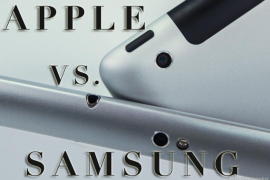Apple vs. Samsung Lawsuit
Ajit Deshpande - August 26, 2012 - 0 Comments
 Last week, a nine-member San Jose jury ruled in favor of Apple in the company’s patent infringement lawsuit against Android-based smartphone and tablet manufacturer Samsung. The jury awarded Apple more than $1 billion in damages, while deciding that Apple on its part had not violated any of Samsung’s patents. A total of seven Apple patentswere ruled to be infringed upon; every one of these patents was associated with look-and-feel and usability features associated with the iPhone and iPad designs.
Last week, a nine-member San Jose jury ruled in favor of Apple in the company’s patent infringement lawsuit against Android-based smartphone and tablet manufacturer Samsung. The jury awarded Apple more than $1 billion in damages, while deciding that Apple on its part had not violated any of Samsung’s patents. A total of seven Apple patentswere ruled to be infringed upon; every one of these patents was associated with look-and-feel and usability features associated with the iPhone and iPad designs.
Whether or not this ruling survives through further appeals and litigation processes, it might be underscoring the viewpoint that user experience as opposed to core technology is the defining aspect for consumption devices such as smartphones and tablets. At the same time, it poses a larger question about the utility and value of patents in the context of innovation in the post-PC era. Already, South Korean and the German courts have issued split rulings for Apple vs. Samsung, each court making a different set of judgments. As these patent wars escalate over the coming years, an early-stage entrepreneur building solutions on top of a mobile platform might be making not just a market adoption bet but also a regulatory bet on the platform/device/design process itself.
The success of the iPhone and iPad was a result of a revolutionary new design consisting of several key form-factor and UI decisions, and Apple has monetized these devices brilliantly. Google on its part continues to succeed in its own Android strategy. Clearly, mobility is a rising tide, and large enterprises such as Google and Apple and Samsung will continue to do well on the basis of their respective operational and financial war-chests. However, if mobile entrepreneurship is to continue unfettered, this might just be the time to revisit patent law and processes in view of the new realities of distributed workforces, pervasive mobility and global consumption economies.